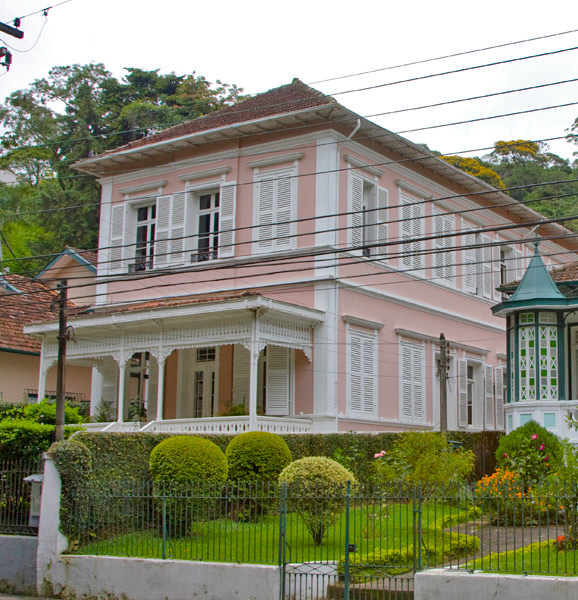Fifth day in Rio, part 1–Petrópolis, The Imperial City
Getting there is half the fun.
The Blackberry announced the day with its usual style and grace. This time, rather than turn it off, I got up, went in the bathroom and left it going, just to see how long Jean would let it ring.
By the time I had gotten out of the shower, it was still shrilly singing, and showed no signs of stopping. I finally turned it off and woke her up just in time to show her my clown face galding. As I mentioned earlier, in confidence of course, my resultant rashes were stranger than ever in Brazil, and had actually begun to resemble a big red clown mouth. We both had a hearty laugh over it, and she got moving in time for us to be upstairs in time for Maria’s scheduled 9:00 breakfast.
More deliciousness that would last us well into the day. The pound cake was on its second outing, but was as good as when it was first baked. Maria kept a sparkling kitchen, and all the food was placed neatly on the refrigerator shelves, we the guests having our own shelf. We weren’t supposed to get stuff from the other sections, because that’s what Maria used for our breakfast. If we did, there would be a charge for it and Maria would be bummed out, or so the sign on the refrigerator said.
I could imagine a bunch of rowdies coming in from a big night, ripping into the goods and eating all the rolled ham and cheese, then burning every one of the cheese ball things, then passing out. Bad guests! Well, not us. We never touched anything on the other shelves. Oh all right, I ate a piece of ham one afternoon, but I put the Saran Wrap back exactly like I found it, and unless Maria was counting, I was gonna get off scot free. But there was always Robson. HE would be the one to rat me out.
Jean called Sylvia to confirm our 10:00 with Marcelo. All was on track. We were a lot brisker today, all except for Robo. He seemed to be feeling even worse. But ever the stalwart, he never complained, and said nothing about it except “HNKONNNNHHHHHH,” and then he was usually talking to a Kleenex.
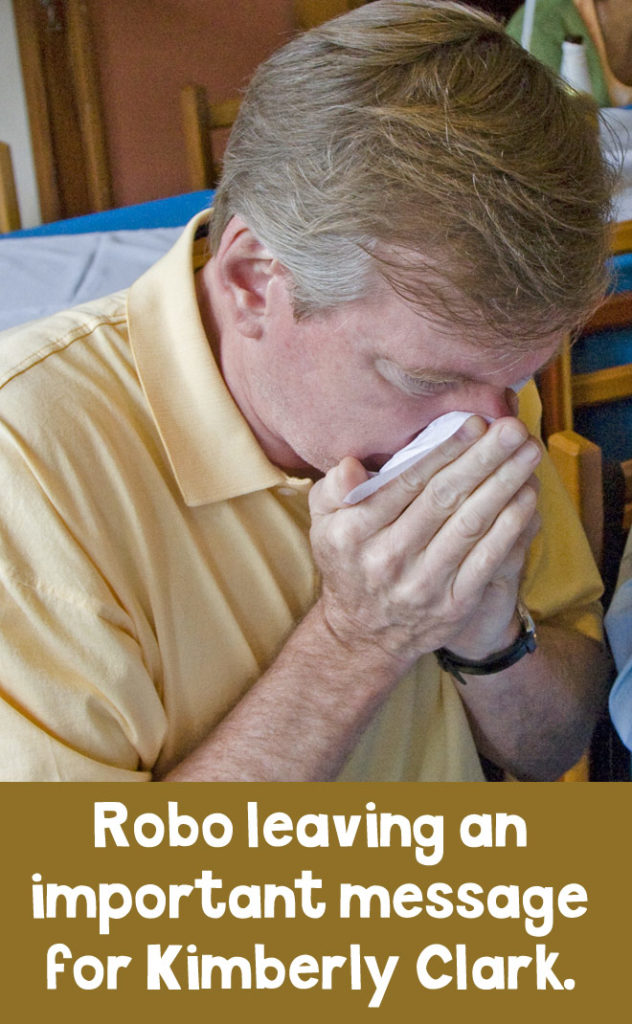 Marcelo pulled up on the dot of 10:00. Okay, maybe he was late. I don’t know or care. We were just glad it was him pulling up, whenever he did it. He honked for us, and we all filed out the gate. As he got out of the car to let us in, we all heard that little “ahhhhhhhh” sound of the glowing choir and harps. He looked so good to us in his business casual outfit, mole free, smoke free, with a head full of knowledge and fun, standing next to his relentless car that would accommodate us all.
Marcelo pulled up on the dot of 10:00. Okay, maybe he was late. I don’t know or care. We were just glad it was him pulling up, whenever he did it. He honked for us, and we all filed out the gate. As he got out of the car to let us in, we all heard that little “ahhhhhhhh” sound of the glowing choir and harps. He looked so good to us in his business casual outfit, mole free, smoke free, with a head full of knowledge and fun, standing next to his relentless car that would accommodate us all.
Did I mention the weather? No? Cloudy. Misty. And we were headed up into the Serra de Orgãos mountains, like way up, right into those clouds. Cool?
We had barely passed the McDonald’s when I turned to Marcelo and asked snidely, “So, how were your new friends?”
“It was an Australian guy,” he replied, saying nothing more, as if waiting on me to ask.
“Well?”
“The first thing he did when he got in the car was ask me (in an Australian imitation) ‘So mate, ya’ know where I can get some ka-kaine (cocaine)?’
I said, ‘What?’
‘Ka-kaine. Ya’ know. . . blow.’
‘No, I am sorry,’ I said.”
His little mini-drama, complete with voices, was hilarious. It was particularly funny to hear a Brazilian guy speaking English while affecting an Australian accent.
But really, what kind of idiot was this guy? Marcelo would be the last person on earth that looked like a cocaine connection. I was kind of insulted on his behalf, but still managed to spit out, “Well, it’s what you get for leaving us.”
The regular citizens are not too hot on cocaine in Brazil, from what I could tell, with the violent crime associations and all. The instruction book that came with our house had a whole section about it. It was written in stern, scare-tactic style, but it made perfect sense. According to the manual, if you even make contact with someone to buy drugs, they will immediately target you, the visitor, who is probably carrying cash and has access to other assets. They watch you, and where you’re staying as well. Then they’ll come in and rob you when you’re out. . .or still at home, which would be worse. These are the people that carry knives and guns.
But then, it can be even worse if you get busted by the police, who are sometimes less than above board. They’ll strip you of all your money, then kick you out of the country naked.
Ka-kaine? Uh, no thanks, mate.
We crossed the bridge heading in a direction new to us, marveling at the changing landscape, which was suddenly becoming more industrial. It was dotted here and there with new enterprises such as car repair and building supply, even pre-fab pools, but it was mainly kind of sad looking. There were several places that sold the brick that is used in all the favelas. I don’t know if it is of an inferior quality (probably), but it could certainly be used creatively in many building applications to stunning result. It is the thing that gives the favelas their terra cotta spark.
“I must get gas to make it to Petrópolis,” Marcelo said, beginning an exit onto a service road. Suddenly, a giant truck came from nowhere, nearly blowing us back into traffic as he barged ahead of us. I almost dropped a load in the front seat, and looked at Marcelo in alarm. There was not an iota of change in his expression.
“Did you see that?” I hollered at him.
“Yes. Are you hurt?” he asked, with just enough sarcasm under his deadpan to smack it home.
Totally unflappable. That’s what he was.
We pulled into a gas station that had a little mart inside. I wasn’t about to pass up a bathroom or a chance to get my new favorite thirst quencher: agua com gaís. While Marcelo filled up, I went into the store to talk to the ladies inside.
I put on my very best expression of international love and told them how thirsty and sweaty I was, and how I loved agua com gaís. Then I held out my hand with money in it and let the cashier take what she needed, beaming at her in the process. She giggled, took the money, I obrigadoed them both and went to find the sanitário.
Sanitário? A misnomer for sure. This place was so totally foul, like a gas station bathroom on the highway to the Bates Motel. These places test your dexterity with the backs of your hands, your feet, and your elbows doing everything. And you want to breathe through your mouth to avoid smelling anything, but then begin to think of the molecules you may be swallowing. Challenging! Fun! I couldn’t wait to get to the car to tell the others! It kept running through my mind how to say in Portuguese, “Sanitário is a bad name for that place.”
Nobody had gotten out but Marcelo and me, and it was funny to come back and see them stuffed in there, D&P in the backback lounging all over each other, Jean half hidden by her purse, Robo looking miserable, and Pettus content and complacent. Through the car windows, it was like looking at some kind of exhibit.
I had cleaned out my water bottles before Marcelo’s new fare came, and felt smug as I filled the pockets again.
The road through the mountain was gorgeous, with different flora peeking out sporadically everywhere. The large view was punctuated by trees that flashed silver among all the green. Marcelo told us that they are
not flowering trees, but showing the underside of their leaves.
We continued higher and impossibly higher, with more to climb. We passed numerous small stands where fruits and vegetables would normally be sold, but THEY WERE CLOSED, of course. Now and again, there would be a place selling colorful rugs made out of recycled cloth. They were kitschy cool, but nobody was interested in stopping and looking at any of it.
Who would expect to pass a horse just standing on the side of the road grazing? Not me.
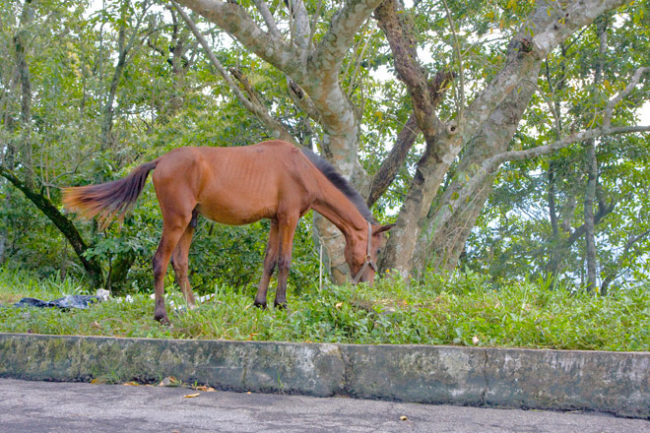
 It seemed that every turn we took in the extremely curvy road yielded another view, partially and beautifully obscured by clouds at times, and crystal clear at others. The onset of Petrópolis was very gradual, until we were hit with the visage of this monstrous German structure.
It seemed that every turn we took in the extremely curvy road yielded another view, partially and beautifully obscured by clouds at times, and crystal clear at others. The onset of Petrópolis was very gradual, until we were hit with the visage of this monstrous German structure.
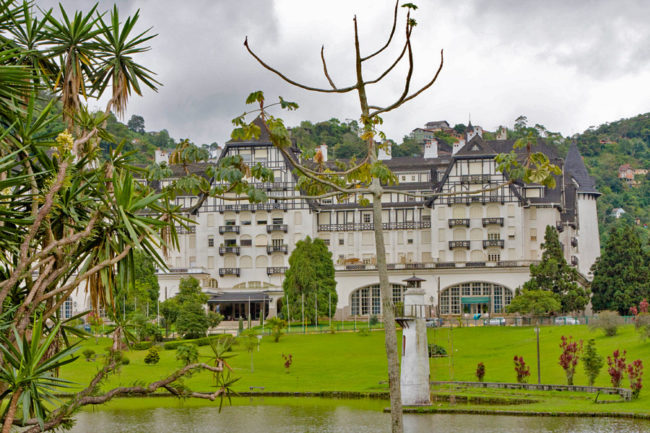 Marcelo told us the name of the place: The Palácio Quitandinha (named for one of the rivers in Petrópolis). He also said that it was formerly a swanky casino resort with ballrooms, restaurants, luxury rooms, and a lake in the front in the shape of Brazil. The abolition of gambling in the 40s and a fire or two put it in lesser stead for a while, as it became apartments. It had now been renovated and is used as a convention center/hotel, and condominiums, too I think Marcelo told us. The lake was still shaped like Brazil, but it was impossible to get the full view, so we had to take their word for it. We went in to gawk at the foyer, and one of the public rooms (roped off to non-owners). The floors were intricately laid local wood. I found this link with other pictures of this marvelous beast.
Marcelo told us the name of the place: The Palácio Quitandinha (named for one of the rivers in Petrópolis). He also said that it was formerly a swanky casino resort with ballrooms, restaurants, luxury rooms, and a lake in the front in the shape of Brazil. The abolition of gambling in the 40s and a fire or two put it in lesser stead for a while, as it became apartments. It had now been renovated and is used as a convention center/hotel, and condominiums, too I think Marcelo told us. The lake was still shaped like Brazil, but it was impossible to get the full view, so we had to take their word for it. We went in to gawk at the foyer, and one of the public rooms (roped off to non-owners). The floors were intricately laid local wood. I found this link with other pictures of this marvelous beast.
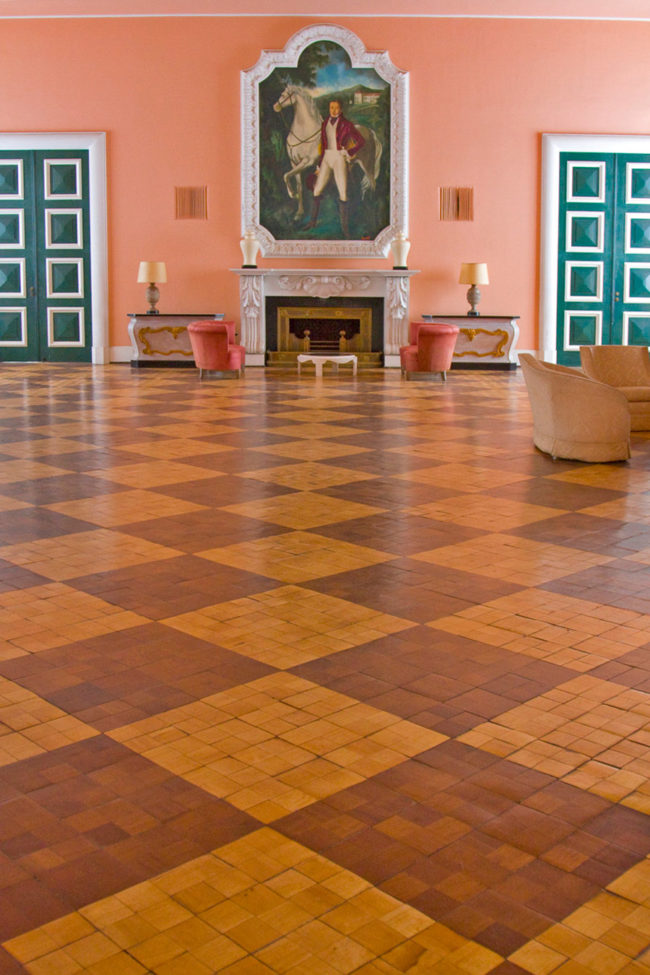 The German styling of the hotel was a nod to their large population and influence in the early days of Petrópolis, which was founded by Dom Pedro II in the mid 1800s as a summer home. His father, Dom Pedro I had found the place coolly refreshing and charming, and in 1822 bought a huge farm, planning to put his summer home there. It was never finished, as he abdicated the throne to his five-year-old son, Dom Pedro II and returned to Portugal for an entirely different royal fight.
The German styling of the hotel was a nod to their large population and influence in the early days of Petrópolis, which was founded by Dom Pedro II in the mid 1800s as a summer home. His father, Dom Pedro I had found the place coolly refreshing and charming, and in 1822 bought a huge farm, planning to put his summer home there. It was never finished, as he abdicated the throne to his five-year-old son, Dom Pedro II and returned to Portugal for an entirely different royal fight.
“What about King John VI?” you’re asking.
Well, we remember that King John VI came to Rio from Portugal in 1808 to escape Napoleon. He set up a great life in Brazil and ruled successfully for over 10 years in Rio, making it the capital of Portugal during that time–the only non-resident capital in the world. He brought innumerable benefits and advances to the country, and they are rightly proud of him.
John left Brazil in 1821 to secure his place in Portugal, because the people there were hacked off about his being out of town all the time. I mean, imagine how the Portuguese felt. Here was old Kingy hauling ass from the Napoleonic threat and leaving them to take care of it themselves, and then returning with all this Brazil nonsense in his background.
He left Brazil in charge of his son, Dom Pedro I, who declared it independent from Portugal and himself Emperor almost
instantly after his father left the country. It was a move espoused by the King to keep Brazil under family rule of some sort before any usurpers came along to claim her.
Eventually the Portuguese got pissed off at DPI, and like his father he decided to go back home to save HIS spot in Portugal. When he abdicated to DPII at his tender age, he had a bunch of regents watching him until he was 15 and deemed fit to rule as the second and last Emperor of Brazil.
Dom Pedro II founded Petrópolis on his father’s land in 1843 when he was about 17. He wanted his summer palace to be surrounded by farms, so he encouraged Rhineland Germans to settle there and have farming outskirts to his new city. Hence all the German influence. The swells and hangers-on followed, and Petrópolis became the hottest place in the mountains. It was even the capital of the state of Rio de Janeiro for several years.
Wow! Head-filling information!
When we were back in the car, Marcelo told us that there was an old Colonial house somewhere around there that was now a little museum we could go look at. Sounded good to us. We were a very placid crowd. He drove around a little bit, missing it a few times, stopping to ask various locals a few times, and then triumphantly pulled up in front. “Here it is,” he said. It was a tiny little thing. Kind of like seeing the Alamo in the flesh.
It was small, but cozy, and you could feel the old vibes in it. There was a cute Brazilian girl that told Patricia about the grants they get to keep the house up, and asked us to sign the book. She never said anything about any money from us.
The first thing that struck me was a shadow box with the Virgin and Baby in it. It was beautiful, being simple, yet ornate at the same time, with the trompe l’oeil columns and millwork. The composition of the figures in the box was dramatic, with their diminutive size failing to fill the frame; the cross loomed high above, a harbinger of huge events.
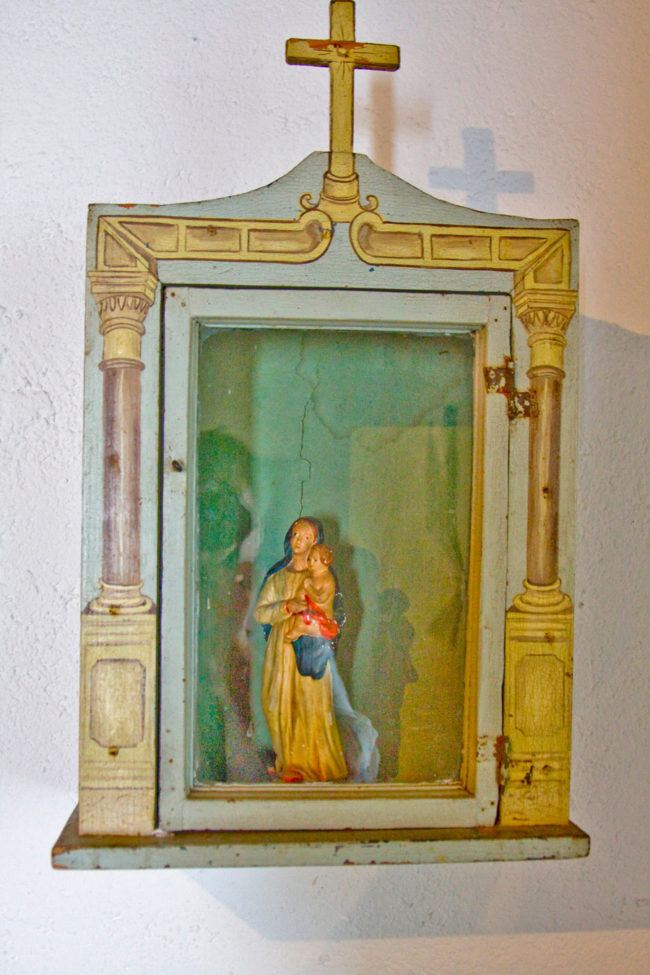 A-HA! The origin of the toilet paper custom must have begun with this chamber pot holder. I don’t see any flusher on it. And of course I was fascinated with it. I like the little shelf for “accessories.”
A-HA! The origin of the toilet paper custom must have begun with this chamber pot holder. I don’t see any flusher on it. And of course I was fascinated with it. I like the little shelf for “accessories.”
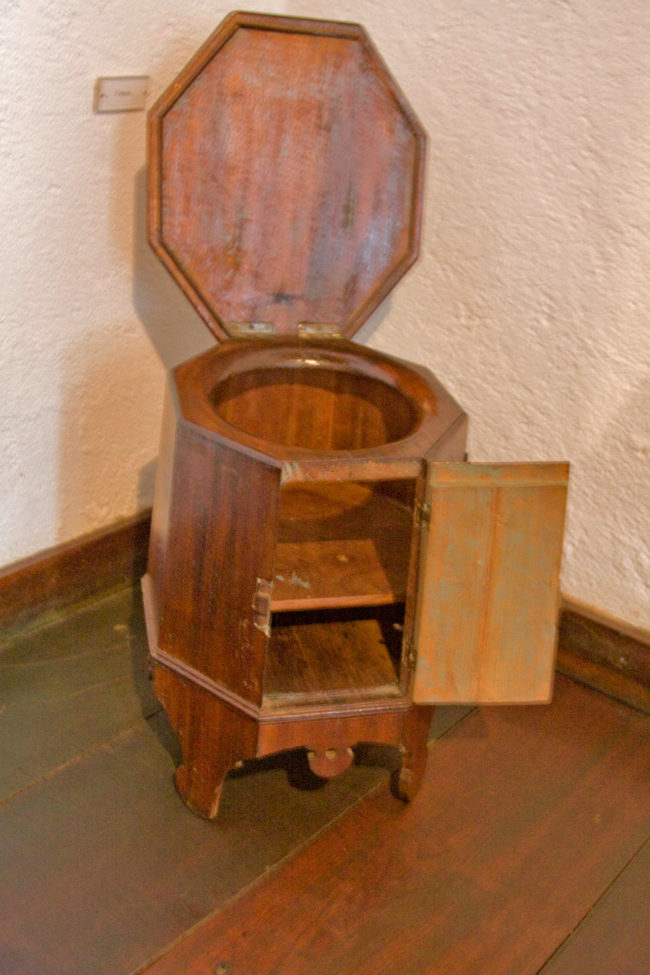 Here’s another good juxtaposition of photos. The chamber pot doohickey with a portrait of Robo, who feels like a resident of said pot.
Here’s another good juxtaposition of photos. The chamber pot doohickey with a portrait of Robo, who feels like a resident of said pot.
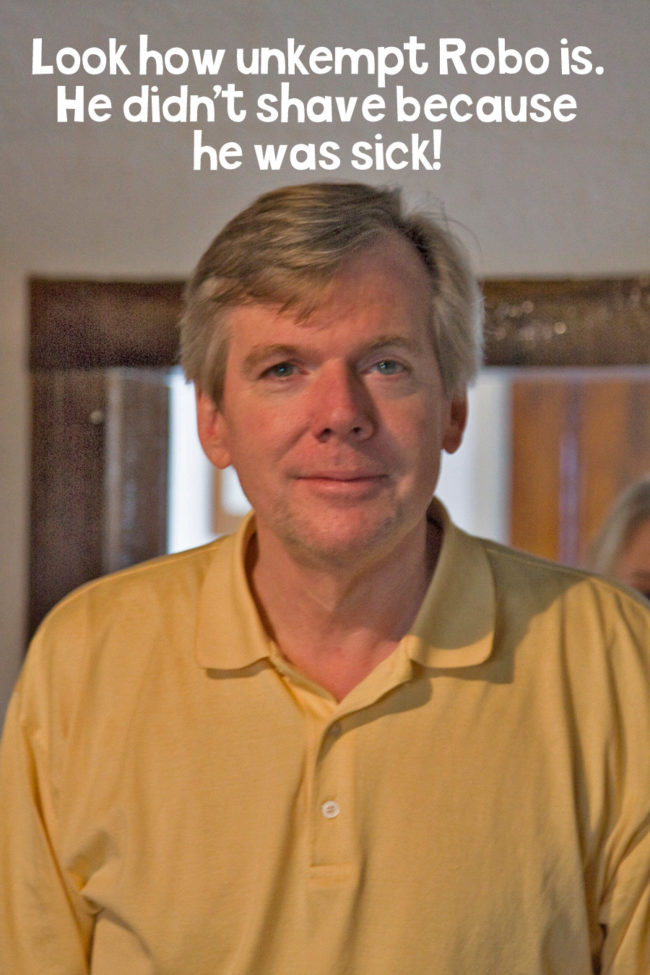 This old sewing machine and victrola were both cool. I always like to imagine the people actually using the stuff that you’re looking at. What kind of music was it?
This old sewing machine and victrola were both cool. I always like to imagine the people actually using the stuff that you’re looking at. What kind of music was it?
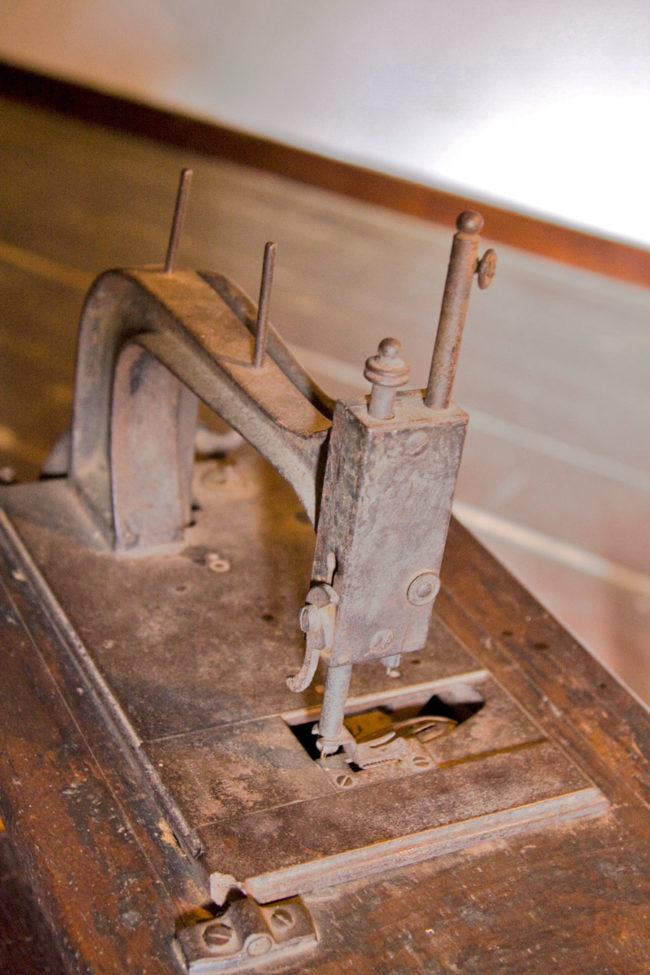
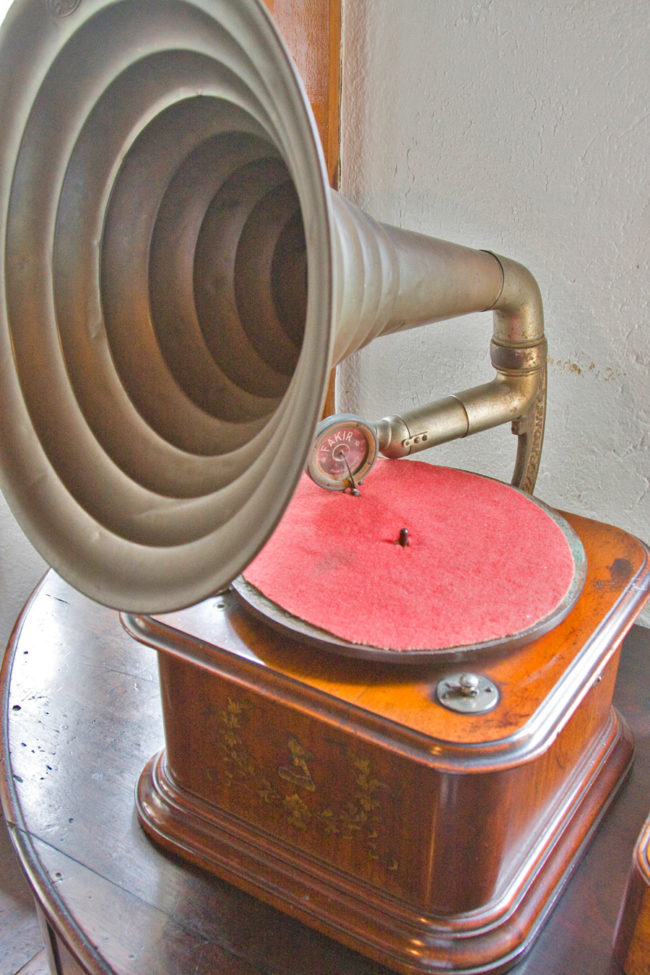 Okay, that was fun. And it was free. Time to go see something else. Marcelo turned around and headed back toward downtown, passing a house on a hill behind a large hedge. “My sister lives there,” he said. I was surprised and pleased that he was telling us about his personal self. “She has a sport camp for kids.”
Okay, that was fun. And it was free. Time to go see something else. Marcelo turned around and headed back toward downtown, passing a house on a hill behind a large hedge. “My sister lives there,” he said. I was surprised and pleased that he was telling us about his personal self. “She has a sport camp for kids.”
“How did she get up here? I thought y’all were from Niterói,” I asked him.
“She thought it would be a good business. Only for about two years has she been doing it. It seems to be doing better,” he said.
Downtown was glutted with traffic and beautiful old buildings. It was obvious that Petrópolis was bursting at the seams and trying to accommodate a more modernized city center while not sacrificing any of the history. They seemed to be doing a pretty good, albeit slow job of it.
It was strange, because after a couple of turns, over picturesque streams and walkovers, we were in a residential area populated with luxurious old homes, some fully restored, some still awaiting the kiss of a dedicated owner.
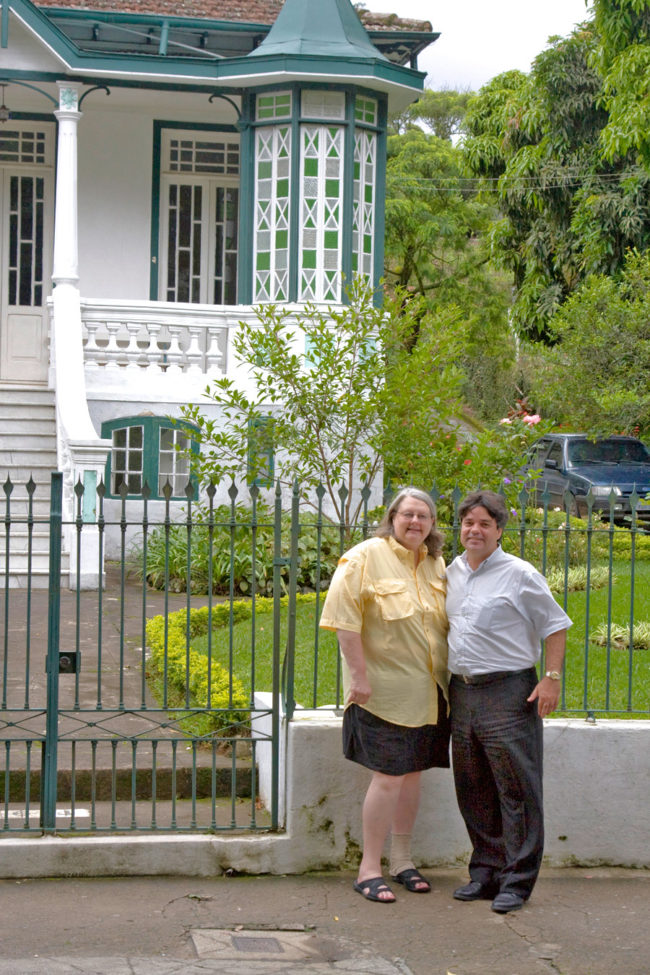
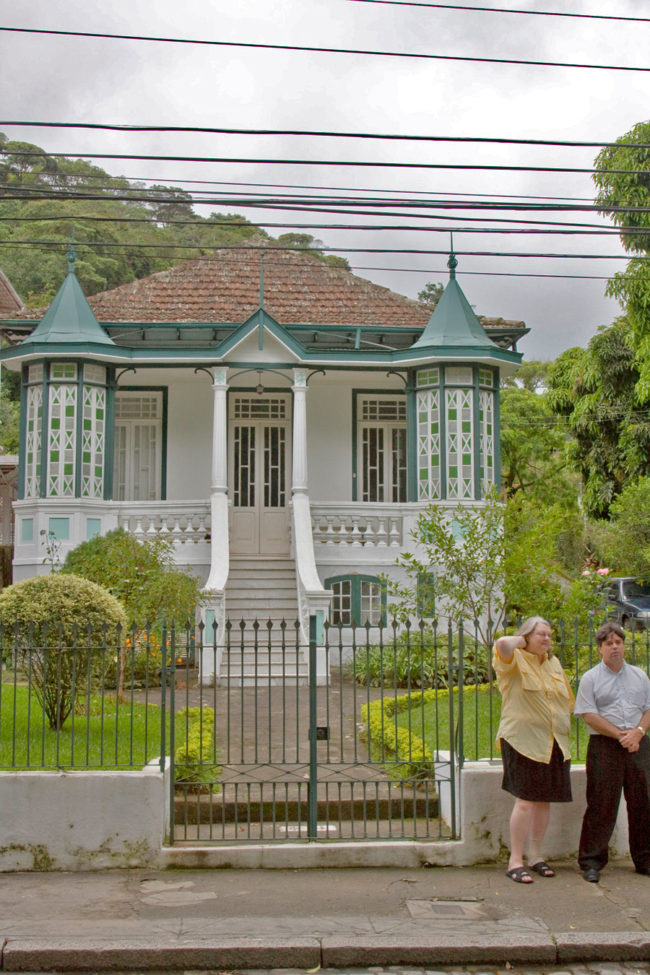 We even passed The Count d’Eu’s home, the rapscallion who was married to Dom Pedro’s daughter, Isabel. I say “rapscallion” because he obviously had streaks of extreme vanity and heartlessness. His reputation was sullied in the late 1860s from his behavior as a late-coming General in the War of Triple Alliance. Briefly, this little war broke out when the president of Paraguay attacked Brazil in 1864. Tiny little Paraguay! Brazil linked up with Argentina and Uruguay to fight this pest, and had him quashed by the late 1860s. Count d’Eu had been bugging his father-in-law, DPII, to make him a general in the war ever since it began, but DPII didn’t think his son-in-law had the right qualifications. The Count continued pestering the old man until he finally relented. By the time the Count got to the war, Argentina and Uruguay had stopped fighting, declaring that they had beaten Paraguay to a bloody pulp, which they had. The Count refused to stop, and forced one of his underlings to participate in what is now called genocide on the Paraguayans. Marcelo seemed rather disgusted by the Count as he told us about his shortcomings.
We even passed The Count d’Eu’s home, the rapscallion who was married to Dom Pedro’s daughter, Isabel. I say “rapscallion” because he obviously had streaks of extreme vanity and heartlessness. His reputation was sullied in the late 1860s from his behavior as a late-coming General in the War of Triple Alliance. Briefly, this little war broke out when the president of Paraguay attacked Brazil in 1864. Tiny little Paraguay! Brazil linked up with Argentina and Uruguay to fight this pest, and had him quashed by the late 1860s. Count d’Eu had been bugging his father-in-law, DPII, to make him a general in the war ever since it began, but DPII didn’t think his son-in-law had the right qualifications. The Count continued pestering the old man until he finally relented. By the time the Count got to the war, Argentina and Uruguay had stopped fighting, declaring that they had beaten Paraguay to a bloody pulp, which they had. The Count refused to stop, and forced one of his underlings to participate in what is now called genocide on the Paraguayans. Marcelo seemed rather disgusted by the Count as he told us about his shortcomings.
His house was large, and occupied a corner lot, but needed more renovation. I believe it was being made into a museum as well.
Right across the street from some of these charming homes was The Crystal Palace, a performance and celebration spot in the center of town, built by Count d’Eu and Isabel to beautify the city for their pals. It was originally deeded to the Horticulture Society of Petrópolis, of which Count d’Eu was head. The pieces to the Palace were begun in 1870 in France, but it took until 1884 to finish the structure. It had now been taken over by the historic trust, and was redone with plexiglas instead of glass, but it was still redolent of luxury and royalty.
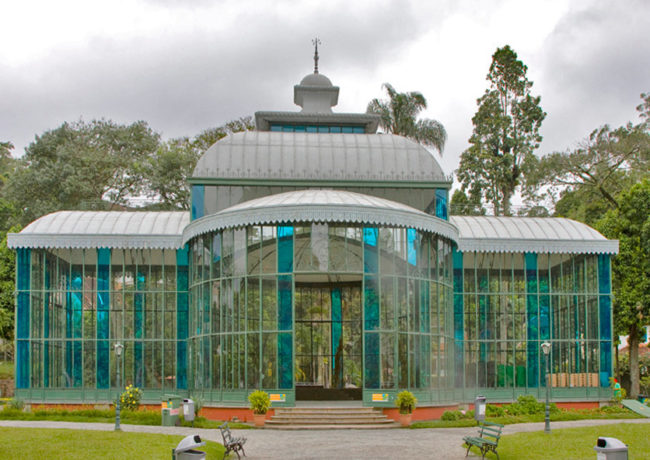 This royal feeling was also for sale, as the Crystal Palace could be rented for private events. There was even a stage there. If Chevy 6 ever played in Petrópolis, I hoped it would be right there. Jean took my picture with an air microphone doing just that. And looking like a gol-durned whale in that white shirt with my tiny head.
This royal feeling was also for sale, as the Crystal Palace could be rented for private events. There was even a stage there. If Chevy 6 ever played in Petrópolis, I hoped it would be right there. Jean took my picture with an air microphone doing just that. And looking like a gol-durned whale in that white shirt with my tiny head.
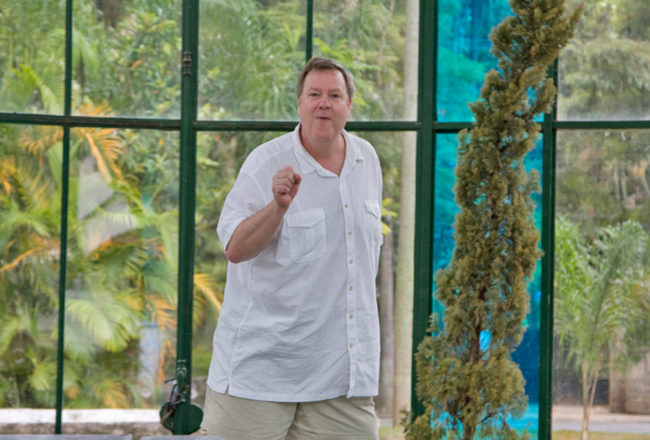
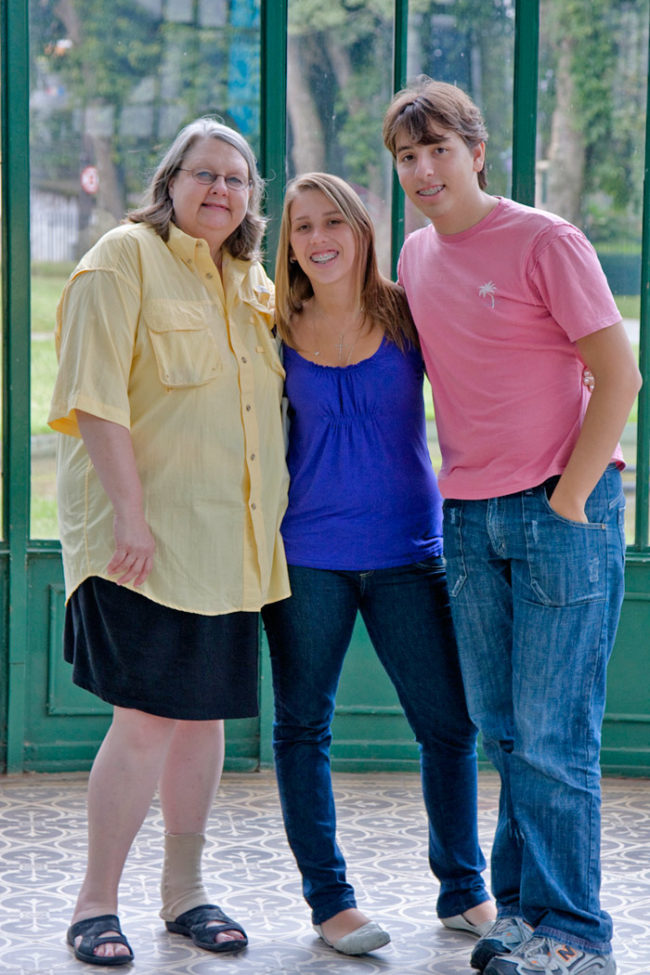
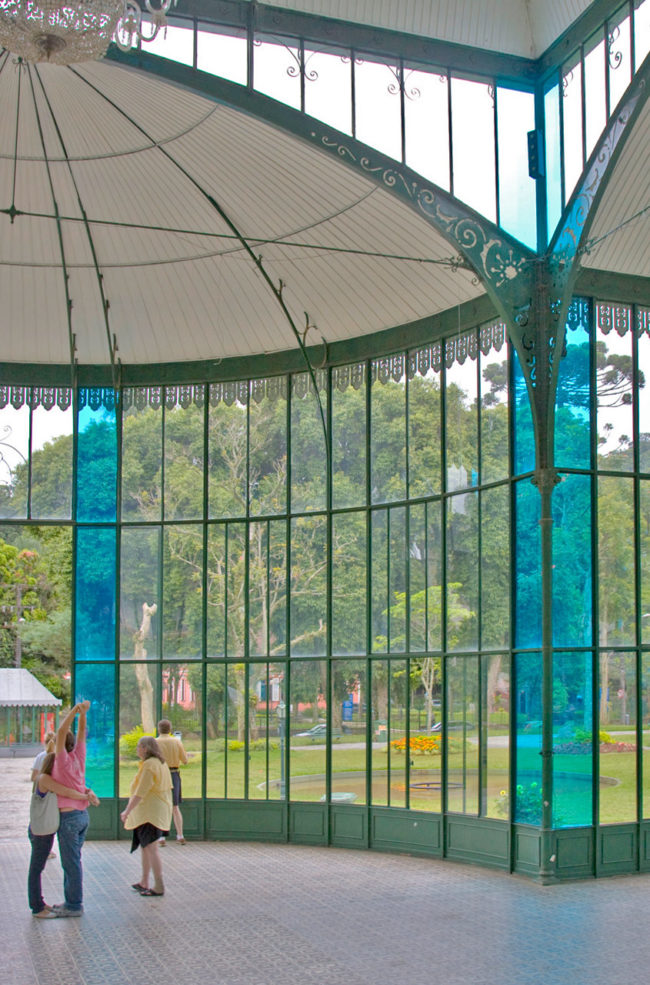 I think it would be kind of weirdly neat to live across the street from The Crystal Palace like these people do. The homes were probably originally owned by friends of the crown, though at the time, the crown was heinously unpopular, due to Dom Pedro II’s daughter, Isabel’s freeing of the slaves in Brazil. You heard me right. DPII went out of town a few times, leaving Isabel as Regent in charge. On one of the trips he took in the late 1880s, Isabel up and freed the slaves while he was gone. Of course, she and her father had shared the idea before, so it’s not like she totally surprised Daddy with her bold move.
I think it would be kind of weirdly neat to live across the street from The Crystal Palace like these people do. The homes were probably originally owned by friends of the crown, though at the time, the crown was heinously unpopular, due to Dom Pedro II’s daughter, Isabel’s freeing of the slaves in Brazil. You heard me right. DPII went out of town a few times, leaving Isabel as Regent in charge. On one of the trips he took in the late 1880s, Isabel up and freed the slaves while he was gone. Of course, she and her father had shared the idea before, so it’s not like she totally surprised Daddy with her bold move.
The reaction was mixed. Pope Leo gave her the Golden Rose, and enlightened people began to call her Isabel the Redeemer. But there was still a very conventional and rich stratum of Brazilian society that supported slavery, and it caused for some damaging discontent with DPII.
In 1889, Dom Pedro II was deposed in a military coup, and his whole family sent packing to Europe: his wife Teresa, his daughters Isabel and Leopoldina, and their husbands and children. It was odd, because most people still loved DPII, and he was a good ruler. Nevertheless, the royal family was banished from Brazil until 1922, the centennial celebration of Brazil’s becoming an empire under DPI. By then, Brazilians felt comfortable in their new Federalist Republic skin since the Constitution of 1891, and also maintained warm feelings for the Doms, who brought more to Brazil than they could have generated themselves. So, in a rather ironic move, the Royal Family was allowed back in the country on their anniversary, by people that had initially kicked them out because of their royalness in the first place.
